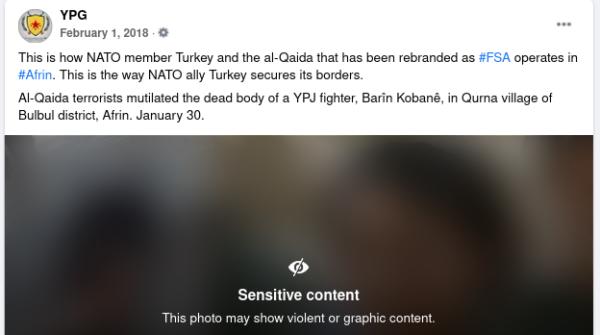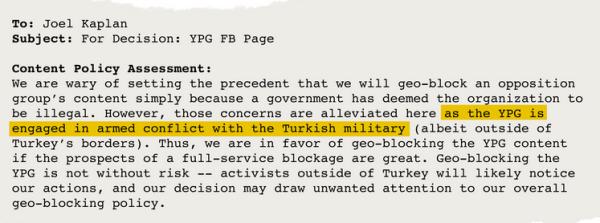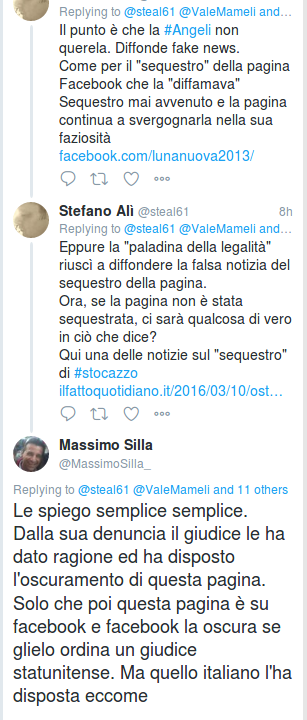That time that Facebook made Turkey happy
Business as usual, really.
In early 2018, Turkey launched a military offensive against Kurdish minorities in the Afrin District of northern Syria, arresting hundreds of its own residents for criticizing the operation. To minimize dissent, the Turkish government also asked Facebook to block posts from the People’s Protection Units. This is a mostly Kurdish militia group, known as the YPG, that among other things published on its Facebook page graphic images, including photos of mortally wounded fighters, writing in one post “this is the way NATO ally Turkey secures its borders”:

Facebook declares that they “believe freedom of expression is a fundamental human right, and work hard to protect and defend these values around the world”. What should they have done in this case?
Easy: keep the platform operational, to protect profits, before human rights: “Cutting off revenue from Turkey could harm Facebook financially, regulatory filings suggest." Just like Twitter, banning Trump only when the block would benefit, not hurt the BOTTOM LINE.
In this case, Facebook “geoblocked”, that is restricted the page in Turkey, following a legal order from the Turkish government and after it became clear that failing to do so would have led to its services in the country being completely shut down.

To know the full story, read how “Sheryl Sandberg and Top Facebook Execs Silenced an Enemy of Turkey to Prevent a Hit to the Company’s Business “.
This post, which is NOT a pro-Turkey, nor a pro-Trump post, is only about a couple of details in that story, that should be valid for any social network, and any country.
A bit more transparency would have been proper, maybe
As the proPublic piece says, and I noticed myself, “Facebook does npt reveal to users in Turkey that the YPG page is explicitly banned. They only get the standard notice that “The link may be broken, or the page may have been removed."
Then a much more complex, or maybe TOO EASY issue
proPublica mentions an official statement by Facebook, saying that:
“We strive to preserve voice for the greatest number of people… There are, however, times when we restrict content based on local law even if it does not violate our community standards."
Now this is a very complex issue, for sure. But I still feel compelled to make a couple very quick observations about “restricting content based on local law”:
- Hell, YES! Forget Turkey for a moment. So far, at least formally, it’s still states that are sovereign and have the monopoly of justice inside their borders, not corporations. I can’t help ask myself whether it’s violation, rather than compliance with local laws, that should be more newsworthy, and thus require formal justifications
- Here is one time in which Facebook did not ‘restrict content based on local law’:

The full explanation of that screenshot is in another post of mine, only in Italian, sorry. Here is the one-paragraph summary, that explains why Facebook listening only to some injunctions upsets me a bit:
“Federica Angeli is an Italian journalist who lives in “house-arrest” conditions, and can only leave her house with bodyguards since 2013, because menaced by a Mafia organization she investigates in her articles. In 2017, Angeli asked to block a Facebook page that classifies her work as slander. An Italian court, recognizing that this was the case, ordered Facebook to obscure the page. But one year later, says Angeli, the page was still there because it is not a US judge that ordered the ban."
Who writes this, why, and how to help
I am Marco Fioretti, tech writer and aspiring polymath doing human-digital research and popularization.
I do it because YOUR civil rights and the quality of YOUR life depend every year more on how software is used AROUND you.
To this end, I have already shared more than a million words on this blog, without any paywall or user tracking, and am sharing the next million through a newsletter, also without any paywall.
The more direct support I get, the more I can continue to inform for free parents, teachers, decision makers, and everybody else who should know more stuff like this. You can support me with paid subscriptions to my newsletter, donations via PayPal (mfioretti@nexaima.net) or LiberaPay, or in any of the other ways listed here.THANKS for your support!